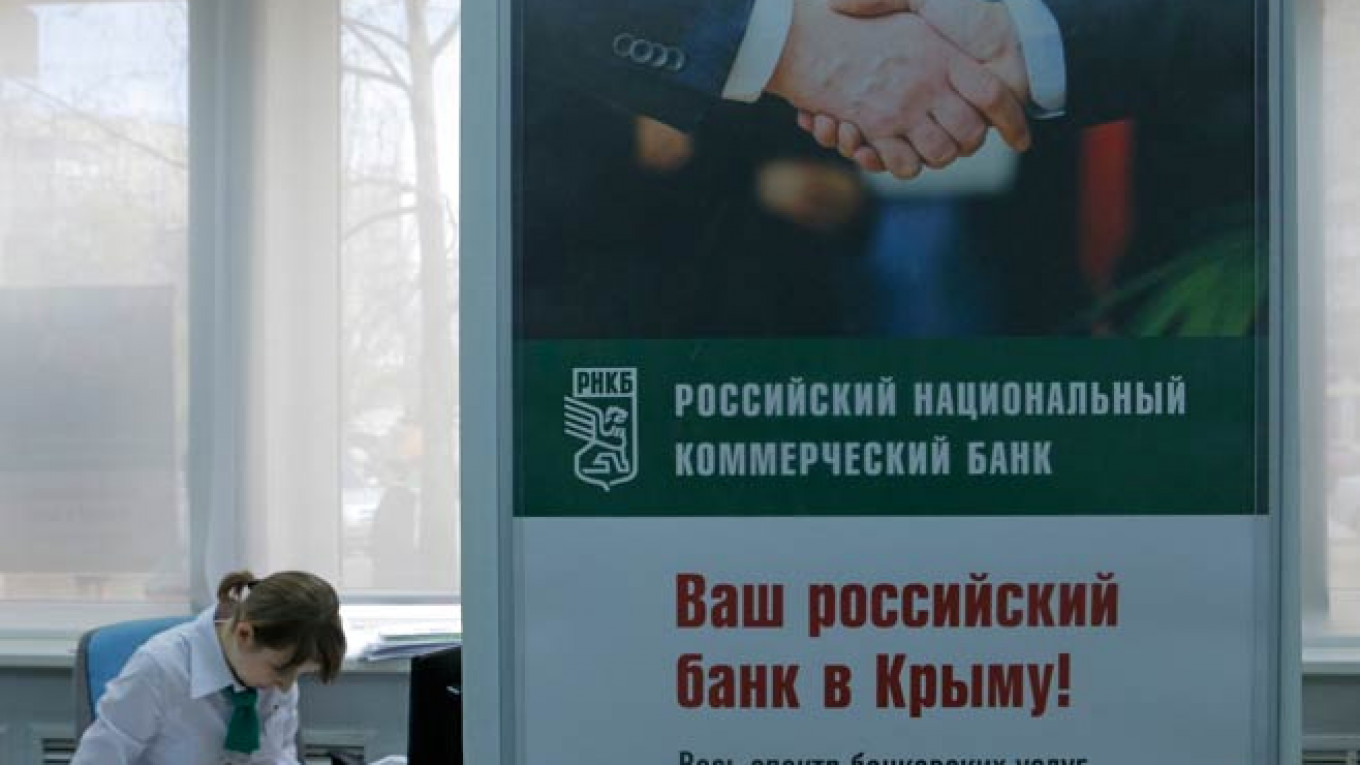Crimea will be swept clean of Ukrainian banks within two weeks, a senior Crimean official said Friday.
In the process, a little-known Russian bank stands to become a major presence on the peninsula — Russian National Commercial Bank, or RNCB, plans to scoop up branches from former market players, with the help of influential local backers.
"Ukrainian banks are fleeing for shelter," Crimea's First Deputy Prime Minister, Rustam Temirgaliyev, told Itar-Tass. "Of a huge network of Ukrainian banks, only four are now operating, and according to our information, these banks could wrap up operations within two weeks," he added.
Russia annexed the Crimean peninsula last month after a snap referendum yielded a 96.8 landslide in favor of separation from Ukraine, according to official results. Apart from provoking an outcry from Western nations, the switch requires a huge restructuring of the peninsula's infrastructure.
As the Ukrainians pull out, Temirgaliyev said, "we are actively building up a network of Russian banks that will work according to Russian laws."
Eighty-eight branches of Russian banks are already open on the peninsula, he said. Next week, "there will be 134," he added, and "by the end of April the number of branches will exceed 250."
One of the prime beneficiaries of the flight of Ukrainian banks is RNBC, the sudden rise of which has closely followed a change in its ownership.
On April 4, the Moscow-based bank — which on Jan. 1 was Russia's 609th largest, with assets of 1.95 billion rubles ($56 million), according to ratings agency RIA Ratings — published a document on its website disclosing its 100-percent owner as RNCB Holding.
RNCB Holding is owned by the Crimean government, Rustam Temirgaliyev said: "It is true. RNCB is the property of the Council of Ministers of the Crimean Republic."
RNCB had belonged to Bank of Moscow, part of the country's second-largest banking group, state-owned VTB. On Wednesday, VTB CEO Andrei Kostin said RNCB had been sold to "legal entities functioning in Crimea," Vedomosti reported.
RNCB did not respond to questions on Friday.
Now the bank is transforming itself into a major presence in Crimea, with the resources to acquire assets from major rivals. "RNCB will open more than 50 branches [in Crimea], among them about 30 that formerly belonged to Raiffeisen Bank Aval," Temirgaliyev said. A subsidiary of Austrian banking group Raiffeisen, Raiffeisen Bank Aval's motto is "Believe in Ukraine!"
Raiffeisen had announced the closure of its 32 Crimean branches on April 6. The decision was made for geopolitical and legal reasons, representatives of the bank in Kiev told Reuters.
Compounding its efforts to expand quickly into the banking vacuum left in Crimea, RNCB this week lowered all charges on cash transfers and information requests for corporate clients to zero.
Temirgaliyev also confirmed reports that RNCB was in negations to acquire the Crimean branch network of major Ukrainian bank PrivatBank, whose 337 offices on the peninsula closed their doors last month.
Behind the exodus of Ukrainian banks from Crimea is Russian banking law, which obliges any bank operating in Russia to register with the country's Central Bank, said Sergei Grigoryan, head of analysis at the Association of Russian Banks. Russia is not unique in this — such requirements are widespread around the world, he said.
There is no politics or pressure behind Ukrainian banks' exit from Crimea, Grigoryan said — the law is simply being unsparingly applied. Any bank could apply for a Russian banking license, but the Central Bank would take months to process the request, during which time the bank would be barred from operating.
As for RNCB, Grigoryan said he saw logic in the Crimean government taking ownership of the bank. Investors may be wary of the risks and uncertainty in Crimea, and it may be essential for local authorities to step in to provide the market with a floor, he said.
But RNCB will certainly be boosted by its new owners, he said, as the government and government-affiliated business will likely do their business through the bank.
State involvement in the banking sector is a rarity in Russia, he added — the state owns stakes in about 70 Russian banks, including the country's six largest.
Contact the author at p.hobson@imedia.ru
A Message from The Moscow Times:
Dear readers,
We are facing unprecedented challenges. Russia's Prosecutor General's Office has designated The Moscow Times as an "undesirable" organization, criminalizing our work and putting our staff at risk of prosecution. This follows our earlier unjust labeling as a "foreign agent."
These actions are direct attempts to silence independent journalism in Russia. The authorities claim our work "discredits the decisions of the Russian leadership." We see things differently: we strive to provide accurate, unbiased reporting on Russia.
We, the journalists of The Moscow Times, refuse to be silenced. But to continue our work, we need your help.
Your support, no matter how small, makes a world of difference. If you can, please support us monthly starting from just $2. It's quick to set up, and every contribution makes a significant impact.
By supporting The Moscow Times, you're defending open, independent journalism in the face of repression. Thank you for standing with us.
Remind me later.


